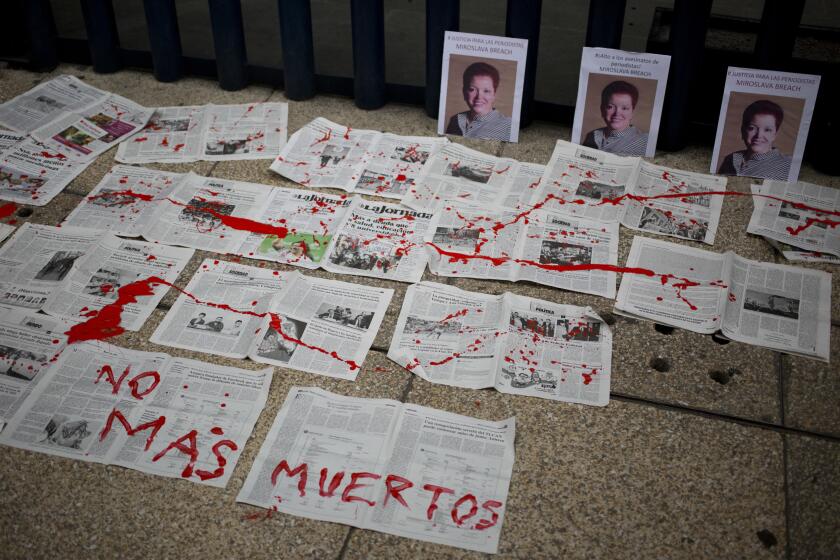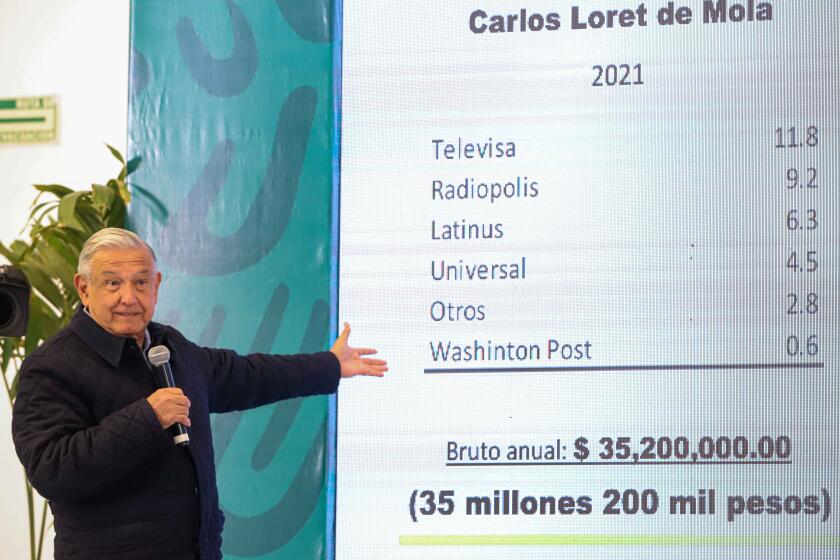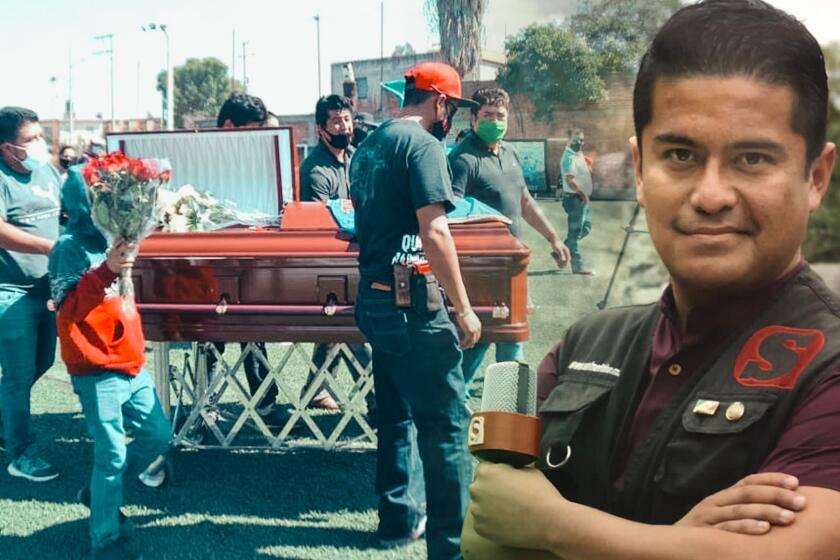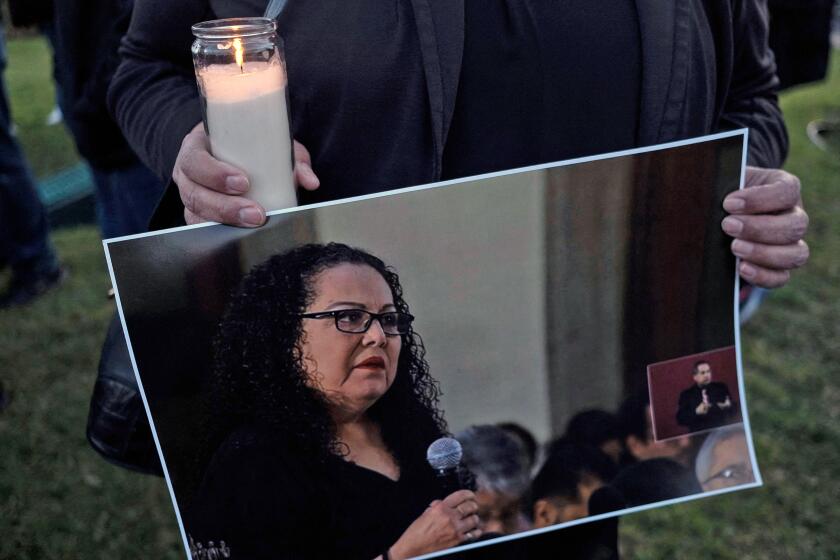An eighth journalist is killed in Mexico this year — just weeks after his colleague
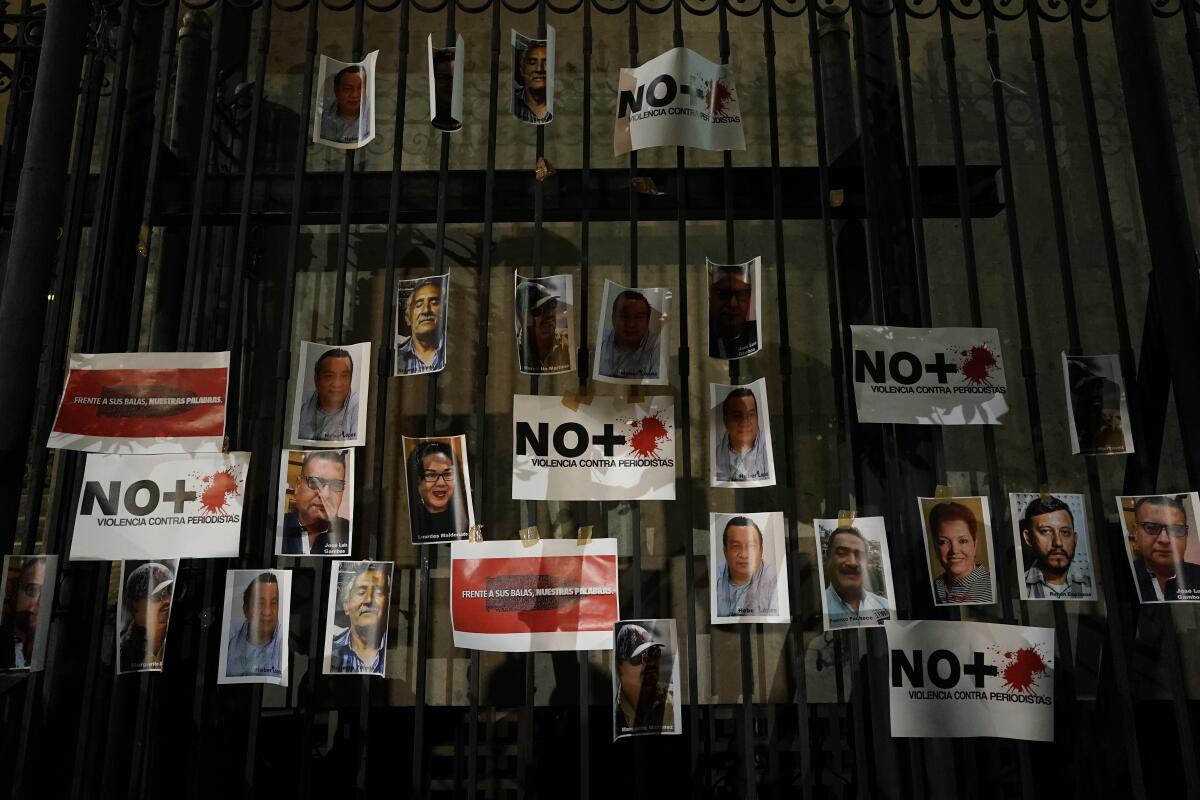
- Share via
MEXICO CITY — Another journalist was shot to death in Mexico on Tuesday, the eighth such homicide so far this year in an unprecedented spate of killings that has made Mexico the most dangerous place in the world for the press.
Reporters and photographers have been killed this year in Mexico at the rate of almost one a week, despite assertions by the government that the situation is under control.
Prosecutors in the western state of Michoacán said reporter Armando Linares was shot to death at a home in the town of Zitacuaro. His killing came six weeks after the slaying of a colleague, Roberto Toledo, from the same outlet, Monitor Michoacán. It was Linares who announced Toledo’s death Jan. 31 in a video posted to social media.
Zitacuaro is one of the closest towns to the monarch butterfly wintering grounds in the mountains west of Mexico City.
The area has been plagued by illegal logging and drug gangs, local governance disputes and deforestation linked to expanding avocado production. Logging has damaged the pine and fir forests where the butterflies spend the winter after migrating from the United States and Canada.
Linares served as director at the Monitor Michoacán website, which on Tuesday continued to show an article he had written about a cultural festival celebrating monarch butterflies.
Mexico was already one of the deadliest countries in the world to be a journalist. Then three reporters were assassinated in January.
There was no immediate information on a possible motive in the killing.
Toledo, a camera operator and video editor for Monitor Michoacán, was shot Jan. 31 as he prepared for an interview in Zitacuaro. At the time of Toledo’s death, Linares told the Associated Press that he had received several death threats after enrolling in a government journalist-protection program.
Asked who he thought was behind the threats, Linares said: “They pass themselves off as an armed group, they pass themselves off as a criminal gang. We can’t verify whether it is true or not that they are this armed gang.”
Four have been killed in the first month of this year alone. The government is fueling this wave of executions.
Criminals in Mexico often claim they are part of a drug cartel in order to instill fear in their victims.
“We have organized crime, just like in the rest of the country, and Monitor worked on a lot of issues like illegal logging, given that we are near the monarch reserve,” Linares said in early February. “We wrote a lot about illegal logging and also a lot of issues like corruption in the municipal government.”
Drug cartels in Mexico often make money by protecting illegal logging, or extorting protection payments from avocado growers.
“The nightmare continues for the press in Mexico,” the group Reporters Without Borders wrote in its social media accounts.
In an apparent act of revenge, President Andrés Manuel López Obrador has tried to shame investigative journalist Carlos Loret de Mola.
Mexican President Andrés Manuel López Obrador has reacted angrily to worldwide criticism of the killings.
In February, López Obrador said U.S. Secretary of State Antony J. Blinken was misinformed after Blinken wrote: “I join those calling for greater accountability and protections for Mexican journalists.”
López Obrador says the government is investigating all of the killings and suggested that Blinken had received bad information from other U.S. agencies, mentioning the CIA, FBI and Drug Enforcement Administration.
“They’re tricking him,” he said. “We don’t tolerate the impunity of anyone.”
Mexican journalists call the crime beat “la nota roja,” the red story. Lurid details guarantee web hits, but documenting the mayhem is among the riskiest assignments.
And last week, López Obrador issued an irate response to European Parliament criticism of journalist killings in Mexico, accusing the Europeans of having a “colonialist mentality.”
The Mexican president criticized EU support for Ukraine and called European Parliament members “sheep.”
In an open letter to the EU Parliament, he wrote: “It is unfortunate that you vote like sheep to join the reactionary and coup-mongering strategy of the corrupt group opposed to the Fourth Transformation” — López Obrador’s preferred term for his administration.
The Parliament approved a resolution March 10 urging López Obrador to stop his harsh verbal attacks on reporters who criticize him and to ensure their safety.
Breaking News
Get breaking news, investigations, analysis and more signature journalism from the Los Angeles Times in your inbox.
You may occasionally receive promotional content from the Los Angeles Times.
Press groups say López Obrador’s daily criticisms of journalists, whom he calls “conservatives” and “mercenaries,” make them more vulnerable to violence.
In February, the Inter American Press Assn. called on him to “immediately suspend the aggressions and insults, because such attacks from the top of power encourage violence against the press.”
The EU resolution “calls on the authorities, and in particular the highest ones, to refrain from issuing any communication which could stigmatize human rights defenders, journalists and media workers, exacerbate the atmosphere against them or distort their lines of investigation.”
Journalists are often the targets of Mexico’s drug cartels, which seek to intimidate and manipulate coverage of their activities and their rivals. Local politicians and government officials are also frequently linked to homicides, according to the government, which has acknowledged that impunity in those killings runs above 90%.
Three suspects are arrested in the slaying of Lourdes Maldonado López, the second journalist killed in a week in Tijuana last month.
In early March, gunmen killed Juan Carlos Muñiz, who covered crime for the news site Testigo Minero in the state of Zacatecas.
Jorge Camero, the director of an online news site who was until recently a municipal worker in the northern state of Sonora, was killed in late February.
In early February, Heber López, director of the online news site Noticias Web, was shot to death in the southern state of Oaxaca.
Reporter Lourdes Maldonado López was found shot to death inside her car in Tijuana on Jan. 23.
Crime photographer Margarito Martínez was gunned down outside his Tijuana home Jan. 17.
Reporter José Luis Gamboa was killed in the Gulf coast state of Veracruz on Jan. 10.
More to Read
Sign up for Essential California
The most important California stories and recommendations in your inbox every morning.
You may occasionally receive promotional content from the Los Angeles Times.

